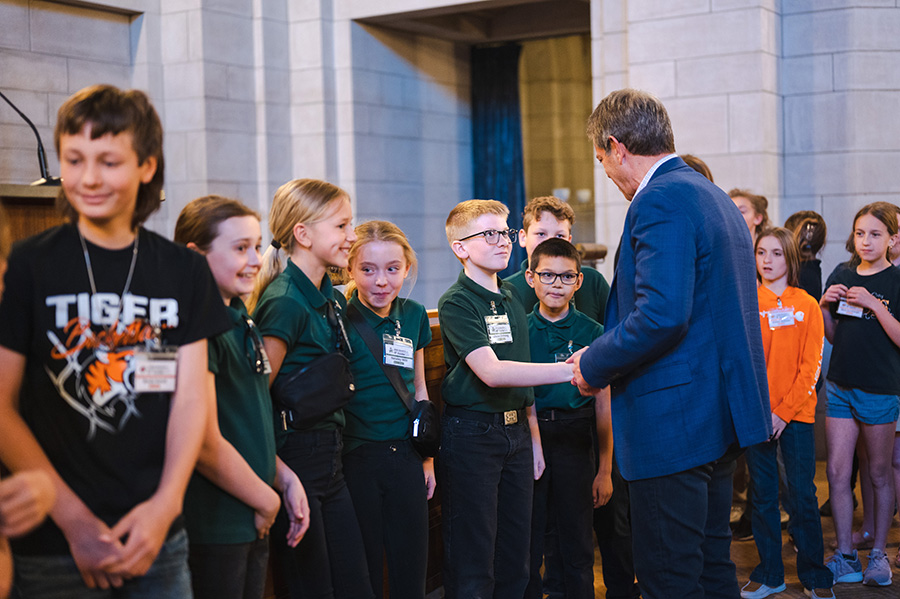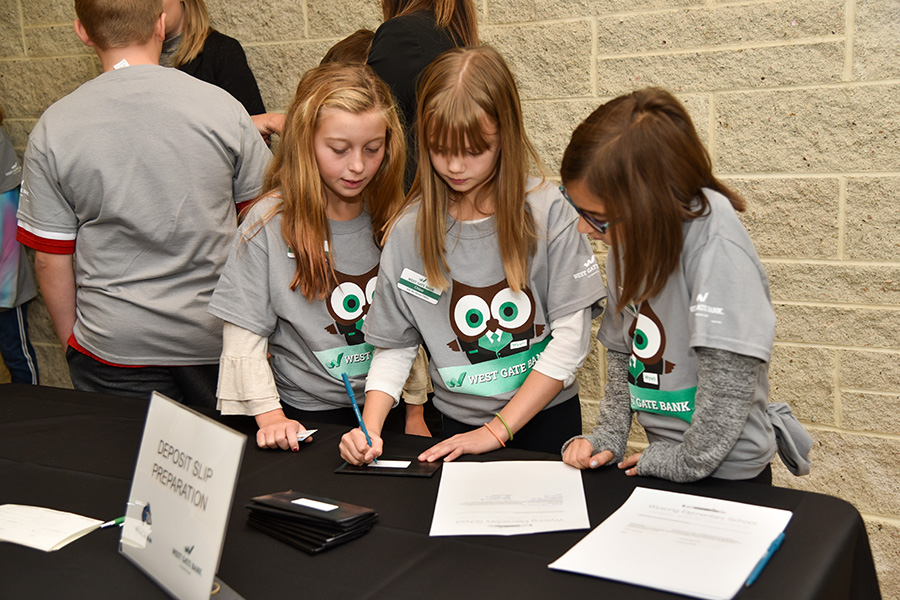Housed in the College of Business since its creation in 1965, the Nebraska Council on Economic Education (NCEE) actively works to educate Nebraskans on financial literacy as a nonpartisan nonprofit entity. From workshops for teachers to in school savings programs for students, their work is making a difference.
 Students with Governor Jim Pillen, ‘79
Students with Governor Jim Pillen, ‘79
The statistics are dismal and alarming — 44% of Americans don’t have enough cash to cover a $400 emergency, 38% of U.S. households have credit card debt, with an average debt amount of $17,000, and 33% of American adults have no retirement savings. In addition, the Fall 2016 Bank of America/ USA Today Better Money Habits Report stated that only 31% of young Americans said their high school education did a good job teaching them strong financial habits. The 2022 Survey of the States reports that only 23 states require high school students to take a personal finance course. The NCEE helped pass LB452 in 2021 when Nebraska became the 9th state to require a semester-long personal finance course for high school graduation.
“With personal finance now required, there is more demand for teacher professional development. 69% of teachers reported they don’t have the skills or knowledge needed for good student outcomes in this area. They need the support we provide through professional development opportunities and interactive resources that align to state standards,” said Jennifer Davidson, ’10 & ’20, associate professor of practice in economics, Nebraska Council on Economic Education president and Nebraska Bankers Association Faculty Fellow.
NCEE achieves statewide impact through five centers located at UNL, UNO, UNK, Wayne State and Chadron State. Each center is led by a director who is a teaching faculty member and an expert in their field of education. In 2022-23, they served 691 teachers and 14,292 K-12 students in Nebraska.
“The more ways we can reach students with important financial literacy, the better,” said Davidson. “Reaching students early is our best bet in changing financial futures, and one way we do that is through coordinating Nebraska’s In School Savings Programs. Time is their biggest asset at this age.”
The programs are partnerships between an elementary school and a local financial institution to set up a special operating branch of the financial institution inside the school. Students can deposit actual money each week and earn small rewards that incentivize savings frequency. Last year, 4,062 students in Nebraska saved $203,349.29 through 45 in school saving programs, averaging $50 in savings per student.
 Writing a bank deposit
Writing a bank deposit
“The Nebraska Bankers Association and our member banks across the state are honored to work with the highly respected NCEE team to help champion nearly 50 in school savings banks, which offer students the opportunity to hone their personal saving skills and successfully launch their lifelong financial journey,” said Richard Baier, NBA president.
Davidson’s research with Bill Walstad, professor emeritus of economics, show long-term, positive financial behaviors, like saving regularly, are directly influenced by getting students to open a bank account early. The program experienced unprecedented growth last year, with 14 new branches and more opening soon.
“At an age where ‘mine’ means holding something, these children eager to save a penny or more are also planning and dreaming of their future. When students learn ‘mine’ can mean sharing resources to plan for their future while impacting others’ lives, an economy is born. These programs make economics something they experience, not simply learn,” said Kelly Lammers, ’81 & ’85, director of the Nebraska Department of Banking and Finance.
NCEE also hosts online academic competitions for students including a stock market challenge, family financial fun nights, statewide celebrations of Financial Awareness Month in April and Economics Education Month in October, and out-of-the[1]box programming like a rock concert (see page 26). Their decades-long effort in highlighting the importance of financial literacy and normalizing discussing financial issues played a role in WalletHub recently naming Nebraska as the most financially literate state.
“Our goal is that those usual bleak national statistics do not represent Nebraska. Our programs directly benefit Nebraska by giving teachers the tools they need to successfully teach students the foundations of financial management, economic reasoning and decision-making. Each teacher we reach will teach hundreds of students throughout their careers, and those students will be able to manage their finances better and be more active participants in our state and nation,” said Davidson.
Published: December 7, 2023